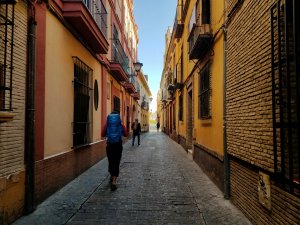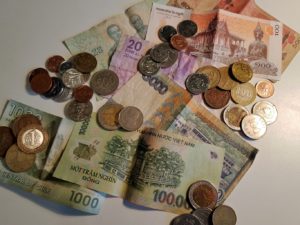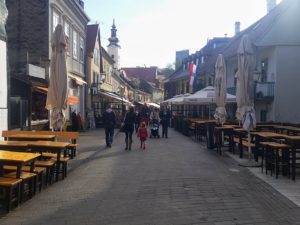Too many people write off travel as prohibitively expensive, with the idea that cheaper travel is unattainable. That’s simply not true. Cheaper travel and longer trips are possible for anyone willing to reconsider the travel process, from research and bookings to the return flight home.

Budget travel doesn’t mean sacrificing the best parts about travel. Affordable travel doesn’t have to be uncomfortable, either. It means making a few simple decisions that save money. Here are some of the ways I personally travel cheaper, which also enable my travels to last longer:
Contents
1. Travel Cheaper – Forget the Fancy Hotels!
Traveling cheaper doesn’t mean you have to stay in a 20-bed hostel dorm room. Hostel dorms are usually only a few beds and nicer than most people presume anyway, but saving money on travel accommodation doesn’t have to mean staying in a hostel, either.
Guesthouses, short-term apartment rentals and smaller hotels are easy ways to save on travel. Many hostels even offer private rooms for the fraction of the cost of a typical hotel room.

Name brand hotels usually offer consistency, amenities and comfort. That’s not always a guarantee, though. On one occasion in a South American capital city (before I discovered hostels), I stayed in a hotel that is known around the world for being comfortable, expensive and fancy. It was not. As it happens, a recognizable brand and more than $150 a night in South America guarantees nothing.
2. Travel Independently, Travel Longer
Tour groups are expensive. It may be easy and carefree to travel in a tour group, but this is not the most economic way to travel. If you want to travel cheaper and longer, independent travel is the way to go.
Group travel has its place, but that place is not in the realm of budget travel.
Most group tours cost several thousand dollars and typically last a week or two. These tours rarely include the cost of flights. It’s not uncommon for travelers to drop $3000, $5000, $7000 or more on a 10-day trip. Before buying a plane ticket! It’s no wonder people think travel is too expensive.
If you’re willing to spend a tiny amount of time researching and booking things yourself, you can save thousands of dollars. Travelers still hesitant to wander by themselves can hire a personal guide to lead the way. In most places, a personal guide for a few days is still far cheaper than a group tour.
Group tours are easy. Tourists in structured group travel don’t have to think about anything or do any research. If that’s the kind of trip you’re looking for, go for it! For those who want the ability to travel cheaper and longer, travel independently. It’s more economical and, honestly, a lot more fun.
3. Travel Solo
Better than traveling independently – that is, outside of a group but with other people – is traveling by yourself. Solo travel is a wonderful experience. Granted, long-term solo travel isn’t for everyone, but you never truly know until you give it a try.

Solo travel has a rewarding and freeing impact on travelers. You won’t have to constantly worry about appeasing someone else. Solo travelers can go at their own pace. They can eat when and where they want. For many travelers, this will save money.
When I travel solo, I don’t have to waste time shopping. I stay in hostels. I eat cheap and spend loads of time just walking around. In short, I save money and do what I want.
Everyone who can should travel solo at least once in their life, even if it’s only a short weekend away. It’s a great way to learn about yourself, and it’s also another great way to travel cheaper.
4. Eat Local
Eating local is a great way to cut costs abroad and make your travels cheaper. To be clear, “local” does not mean local fine dining. For instance, eating at a Michelin-star restaurant in Bangkok (yes, there are several) is not what I mean when I encourage local eating.
Don’t get me wrong. If you have the means, desire and appreciation to enjoy a world-class meal at any time, take the chance. But if you are trying to travel cheaper, fine dining is not the answer.

Eating local with the aim to save money is all about finding the little holes in the wall, the mom-and-pop shops and street food. Forget about the table cloths. Find a small, unassuming cafe. Not only is the food in these “hidden” places often better, it’s budget-friendly. For adventurous eaters, apply these guidelines to safe eating in Southeast Asia. The tips are useful for eating abroad in many places.
Eating local food is a great way to experience a more local side of a destination, but it is also an easy way to save money so that you can travel longer.
5. Sign Up for Rewards Credit Cards!
Without a doubt, the single most expensive part of traveling abroad is the cost of airfare, at least most of the time. Lodging/accommodation is another major cost of travel. These two aspects of travel can quickly add up and make a trip considerably more expensive. To many people, the costs of airfare and hotels is enough to write off traveling altogether.
There are easy ways to defray – or outright eliminate! – these expenses. How? Travel rewards credit cards.
No, it’s not a scam, and there is a card for just about everyone. Picking the right card for you can mean easily earning enough points/miles to cover flights or hotels for your entire trip.
If you (wisely, of course) transfer as much spending as possible from debit cards/cash/checks to credit cards with travel rewards, the rewards can easily cover substantial travel costs. This is only sensible if you spend normally, avoid big purchases you wouldn’t otherwise buy and pay your bill ON TIME.
There are a ton of options, so take the time to research appropriately. This review from Money is an excellent place to start diving into the world of travel credit cards. Imagine turning everyday spending into free travel. That is how you travel cheaper and longer.
6. Stick to a Travel Budget
Too many travelers set off without a budget. For the average traveler, that is not a good idea. The constant swiping adds up, and when you’ve got the distractions and excitement of exploring a new place, it can be difficult to keep track of all the spending.
What if you’re in a cheap location? Well, that’s a great start! However, disregarding a budget, even in a cheap destination, can quickly lead to spending a lot more than you realize.
This doesn’t mean that you can’t splurge here or there. You can stick to a budget and do all the fun stuff, too. The key is to have simpler, cheap days to offset the more expensive days/activities.

You can save on food for a day or two by cooking for yourself or shopping at the supermarket. Instead of taking an organized day trip, using public transportation to reach a trailhead is a cheaper alternative. Offset hotels with time in hostels. There are so many ways to have budget travel days to offset the occasional splurge without sacrificing the fun.
Set a budget. Stick to it. It might not sound like a fun thing to worry about when you’re staring at delicious food and wandering the streets of postcard-perfect little villages, but responsible and disciplined budgeting is important to travel cheaper and longer.
7. Pay with Cash
I know, as mentioned above, credit cards can be a great way to earn miles/points/rewards for your spending. A lot of these cards will offer the same rewards abroad, but using cards abroad can also be frustrating.
The reason I use credit cards sparingly when I’m abroad is for practical reasons. I don’t spend that much money when I travel, and it’s one less thing I have to worry about monitoring. My credit card spending when I’m traveling is generally kept to secure online spending like transportation and accommodation. It’s easier to stick to a budget and track daily spending when I’m not swiping for every purchase.
Unless you’re earning killer perks with a credit card on every purchase, pay with cash. Even then, I’ll often sacrifice the few miles/points to make my life easier or avoid using my card somewhere sketchy.

Physical money is always a better way to keep track of finances. On a subconscious level, paying with physical money registers as spending more than swiping the plastic over and over.
Another simple way to save is efficiently using ATMs. Foreign ATM charges can add up, and most banks charge foreign “processing” and “conversion” fees on all international card purchases. Withdraw cash sparingly.
It’s certainly greedy of banks to charge people to access and use their own money, but there’s no way to avoid this. There are, however, some banks/credit card companies that charge customers less (or nothing at all) for these foreign transactions. Find and use one of these banks. You’ll save money on card purchases and ATM withdrawals abroad.
8. Don’t Travel in Peak Season
What if I told you that Amsterdam is a more expensive place to travel in summertime? And so is Prague and the South of France? What if I said that Munich is crazy expensive during Oktoberfest? Or that prices in Southeast Asia are higher in November and December?
These are examples of peak season. Almost every tourist destination in the world has a peak season, when, for one reason or another, tourists visit in higher numbers.
The simple law of supply and demand applies to travel, too. When the demand for services is higher, so are prices. That means hotels, excursions and even restaurants raise prices because they can.
If cheap travel is the goal, don’t travel during peak season. Visit Southeast Asia during the shoulder season. Go to Munich after Oktoberfest.
How about an air-conditioned, clean, beachside room on the island of Koh Lanta (Thailand) for about $6USD/night? That’s the offseason for ya, and that’s how I managed to travel cheaper and stay longer in paradise. Sure, it was hot, but the water was the perfect way to cool down from the sun on that EMPTY beach.

Yes, better weather is tempting, but at what cost? Literally. How much are you willing to pay to ensure Thailand is not as hot during a trip? I hate to be the bearer of bad news, but it’s always hot there. And the sun still comes out during the rainy season in Southeast Asia. The main differences in peak season are higher prices and larger crowds.
Eventually, I will make it to Oktoberfest. In the meantime, I’d rather spend a couple of weeks somewhere else for the same price as two or three days at Oktoberfest. Traveling in the offseason or shoulder season is a great way to travel cheaper and extend the length of a trip.
9. Choose Cheaper Destinations
The easiest way to save money on travel is to choose cheaper destinations. A little bit of research and an open mind can mean saving thousands of dollars and enjoying longer travels.
Famous and popular tourist destinations are almost always more expensive than necessary. But similar experiences can often be found in lesser-traversed places. At the same time, some places are simply cheaper than others no matter how popular they are.
For people who just want to travel somewhere and are discouraged by the apparent high costs of travel, consider alternate destinations. There are stunning mountains, vast deserts, enormous cities, pristine beaches and great food in every corner of the world.
For cheaper travel, expand your horizons. Widen the search. What’s the point of having the same travel experience as everyone else anyway? A small amount of research can lead to the most exciting trips and save thousands of dollars. There is always a cheaper travel alternative.

Here are a few examples of cheap travel destinations where your money goes further on the ground:
- Southeast Asia
- South Asia
- Central America
- Eastern Europe
10. Flexible Travel Dates Saves Money
Traveling with flexible dates is challenging for most people. Not everyone has the liberty to freely pick and choose their departure dates, and I understand that.
Popular tourist destinations – for instance, places in Europe like Paris, London, Amsterdam, Madrid, etc. – are busier on weekends. Arranging to be in these places in the middle of the week means accommodation rates will be lower. I try, though not always successfully, to spend my weekends in smaller, less touristy destinations.
If you are able to be more selective with departure dates, you can travel cheaper. Flights departing in the middle of the week are generally cheaper. Some of the best travel deals are last-minute deals. For those who don’t have the flexibility to drop everything and travel with little notice, booking far ahead with a little wiggle room is the best option.
Having a rigid schedule usually makes travel more expensive. With flexible travel dates/plans, you can take advantage of cheaper airfare, hotel rates and other costs when demand is higher. Flexible travel dates are a great way to travel longer and cheaper, and you might even find your destinations less crowded.
11. Start Walking
I save money when I travel by walking as much as possible. Taxi fares and Uber charges add up. Local buses or subways, while typically a cheap way to get around, are not free.
Walking instead of paying for transportation can save a few bucks a day. Over time, the savings add up and are an easy way to travel cheaper. In addition to savings, walking is a great way to see more of your destination.
Getting around on your own two feet is also an easy way to avoid gaining travel weight. Travel is often an unhealthy undertaking for many people, but it doesn’t have to be. Best of all, extra walking means I earn more of the beer with which I reward myself. At least that’s what I tell myself.
When I travel, I rarely hold myself back when it comes to eating. And I’m not known for passing up that second beer, either. That’s one reason you can always find me in the gym before and after a trip. Walking ten miles a day when I travel might negate a fraction of what I consume, but it eliminates almost all of the guilt! And I save a few bucks a day that goes towards spending money where I enjoy it – experiencing my destination with food and drink!
12. Pack Smarter, Travel Better, Travel Cheaper
Not everyone has the freedom to spend months at a time traveling. For many travelers, a day on a bus here or a half-day on a train there cuts into time that could be spent sightseeing, wandering and eating – all the best things about traveling somewhere new.
It’s not uncommon for tourists to take short flights to maximize time spent in the actual destination. These flights can add up, but there are ways to minimize the financial impact.
Lose the bag fees.
Checked bag fees can be expensive starting with the first bag. Occasionally, bag fees are as low as $15 – in rare instances, free – but in my experience, $25-40 is normal for a domestic flight in the United States. International (transoceanic) flights regularly charge more than $50 for the first checked bag. The cost to check a bag on my last transoceanic flight was $60 each way.

If you purchase a bag that is small enough to be a carry-on, you’ll save money. What I did was buy a backpack that splits into two pieces: A small backpack that I use as a personal item; and a larger part that zips up like a duffel bag. Before I get on a plane, I break down the bag into two pieces. It takes 1-2 minutes to disassemble or reassemble the backpack.
I spent about $200 on this backpack, but it’s even CHEAPER now! The first trip in which I used the new backpack consisted of three flights that had a total of $160 in bag fees for the first checked bag. My bag conveniently splits in two, so it appears (and functions) small enough to be my carry-on and personal item.
In a single trip, this bag nearly paid for itself by helping me avoid checked bag fees. Pack lighter and smarter, and invest in a practical bag. This is an easy way to shave a few hundred bucks off of a trip. By my estimations, I’ll save thousands of dollars in bag fees by the time this backpack wears out.
13. Leave the Kids at Home
No, I don’t have kids (yet). We’re not talking about Summer vacation, either. I’m just saying, if you’re not going to Disney World and you want to save money on travel, leave the kids at home.
Honestly, what benefit is there to bringing a 5-year-old to Europe? They’re not going to remember much, if anything, from the trip. Even most 12-year-olds aren’t going to appreciate traveling in foreign lands.
Traveling with kids means it will be more difficult to go for a hike, visit a winery or have a nice dinner. Most kids don’t like museums. Walking several miles a day isn’t easy for them. And you’ve always got to keep an eye out. I’ve never hired a babysitter, but doing so in a foreign country must be difficult and unnerving.
Perhaps I’ll feel differently when I have children, but I think saving a couple thousand dollars now – this includes flights, larger hotel rooms, souvenirs and extra admission prices – will benefit kids later.
I’m not suggesting anyone withhold their kids from the world of travel. Rather, travel can be expensive, and I don’t understand the reasoning behind spending gobs of money traveling with small children when they might appreciate it better (and, ya know, remember some of it) a few years down the line.
Leave the kids at home. Your own travels will be cheaper, more enjoyable and less stressful. A couple of weeks with the grandparents (or whomever) is good for everyone.
14. Cut Out the Extra Stuff
Why is it that when people travel they suddenly decide to go on shopping sprees, eat expensive food for every meal and live some imaginary Beverly Hills lifestyle?
Why do people who can’t afford to live that way at home suddenly turn on the switch to burn money abroad?
If the goal is to travel cheaper, and, by doing so, enable yourself to stay abroad longer, then stop wasting all that damn money! Cut out the extraneous fluff. The same methods you employ at home to cut back on expenses or save for something special work for budget travel, too.
Not to sound too cliche, but skip the expensive coffee. Sure, slowly sipping an espresso on a corner in Paris is a moment to savor, but spending a few bucks every day on coffee will quickly eat into a budget.
Budget travel abroad is very much like being cheap at home. Choose the right moments to splurge, and don’t make it a habit. To travel cheaper and longer, you’ll have to exercise discipline and a bit of sense.
15. Stop Buying Souvenirs!
No one cares that your new scarf is from Milan. And do you really need that $20 t-shirt that says the name of whatever city?
When I travel, I hardly shell out for souvenirs. I certainly don’t seek them out. I keep a few bottle caps and a few coins. Sometimes I buy one of those pretty, albeit touristy, canvas paintings. They roll up nicely into my bag, and I make sure to get a good price. Otherwise, I’m not interested in more junk cluttering my life. I never go out of my way to buy a souvenir.

If you’re going to buy a souvenir, make sure it’s cheap, small, lightweight and not breakable. Larger souvenirs – things like rugs, lamps or other useless junk – are a waste of money. At the very least, it hinders an attempt at budget travel. Buying anything that doesn’t fit inconspicuously into your bag is not the way to travel cheaper.
Most of the things I buy when I travel are practical items. In Hoi An, Vietnam, I bought a water buffalo leather wallet. It was useful and less than five bucks. Naturally, like an idiot, I lost my wallet in Bangkok.
I also try to take pictures with myself in the frame. What better souvenir is there than an image capturing a memory of a place with yourself in the image? Seeing yourself in an image is a great way to look back and reflect on past travels. Added bonus: pictures are free and don’t take up space in your bag.
I used to buy magnets, cheesy tourist hats and the occasional trinket. Now, I don’t waste time or money on such things. Instead, by traveling a little cheaper, that extra money goes towards something better. Something like longer travels.
There aren’t many ways or tricks to simply cut travel costs by 50% in the blink of an eye. Some money-saving measures are more tedious than others, but there are several steps to travel cheaper and longer.

Each step you take to travel cheaper adds up, and, eventually, there’s a surplus. Whether that surplus is used to travel longer, splurge on a fancy meal or put back into savings, the options are there. Better, longer and more interesting travels starts with cheaper travel.
Leave a Reply
You must be logged in to post a comment.